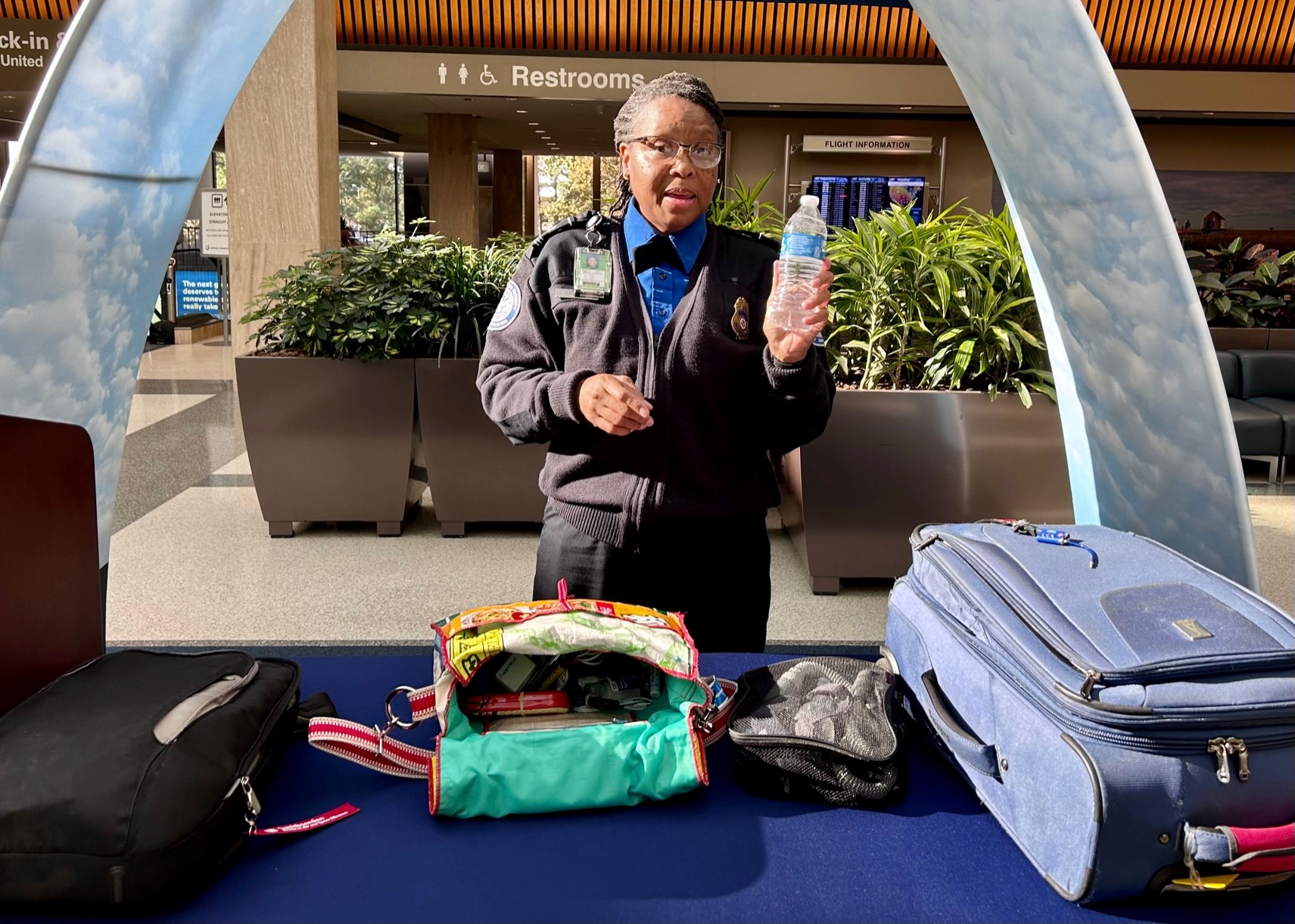 A TSA officer shares tips on how best to pack a carry-on bag. Here she points out that travelers should finish their beverages before coming to a checkpoint. (TSA photo)
A TSA officer shares tips on how best to pack a carry-on bag. Here she points out that travelers should finish their beverages before coming to a checkpoint. (TSA photo)
PHILADELPHIA - Transportation Security Administration (TSA) officers want to share some advice and tips to make the checkpoint screening process go smoothly at Philadelphia International Airport.
“With a little planning and thought about how to pack, passengers can help facilitate the TSA security screening process and ease a passenger’s travel experience at the airport,” said Gerardo Spero, TSA’s Federal Security Director for the airport. “That’s why it is important to know what can be packed in carry-on and/or checked baggage before arriving at the airport.”
Planning ahead and packing properly “can facilitate the TSA security screening process and ease a passenger’s travel experience at the airport,” Spero said. “That’s why it is important to know what can be packed in carry-on and/or checked baggage before arriving at the airport.”

The most common thing that slows down a traveler at a TSA checkpoint is having a prohibited item in a carry-on bag, and with passenger volume nationwide exceeding pre-pandemic levels, and with recent checkpoint volume often topping 2.7 million travelers per day, it is even more important for travelers to “Know Before You Go” by knowing the contents of their carry-on bags and ensuring that everything packed inside is permitted to be carried onto a flight.
“We are seeing a lot of travelers arrive at our checkpoints with beverages and a variety of knives,” Spero said. “It’s important to remember that liquids, gels, aerosols and spreadables are limited to 3.4 ounces in one clear quart-sized bag in carry-on bags. Finish that bottle of water, energy drink or cup of coffee before you get to the checkpoint. Pack the larger shampoo, toothpaste, sunblock and hair gel in a checked bag. As for knives, if you must travel with a knife, please pack it in your checked bag.”
TSA’s advice is that when a traveler is ready to pack for a trip that it is best start with an empty bag so the passenger knows with certainty what they have inside and they know that there is nothing prohibited in a side pouch, zippered pocket or just in the bottom of a bag. That goes for backpacks, roller bags, handbags, messenger bags, shoulder bags, laptop bags, duffle bags and any other carry-on bag or luggage.
TSA offers five convenient ways to find out if an item should be packed in a carry-on bag, checked bag, either or neither.
- TSA’s homepage. TSA has a great feature on it’s homepage. In the upper right-hand corner of the homepage it says “What Can I Bring?” Click on those words, type in an item, and it will let you know where the item should be packed.
- MyTSA app. TSA has a free downloadable app called MyTSA, which has a quick search function that lets you know which items you can bring with you through the checkpoint and onto the airplane. Not only that, but the app also enables travelers to check the delay information at their airports, check how busy the airport is likely to be on a specific day and time of travel based on historical data and it lets people know which airports and airlines support TSA PreCheck®.
- Tweet your question. TSA is very active on social media and has a popular Twitter account where travelers can send their questions: @AskTSA. Type in the item or send in a photo of the item to @AskTSA to inquire if the item can be packed in a carry-on or checked bag.
- Send a question via Facebook. TSA’s social media team is on Facebook and travelers can send in their question about where items should be packed via Facebook Messenger.
- Send a question via text message. Travelers can send in a question to TSA via text message. Text “Travel” to AskTSA (275-872) to inquire where an item should be packed.
It’s also important to remember that even if an item is generally permitted, it may be subject to additional screening or not allowed through the checkpoint if it triggers an alarm during the screening process, appears to have been tampered with, or poses other security concerns.
